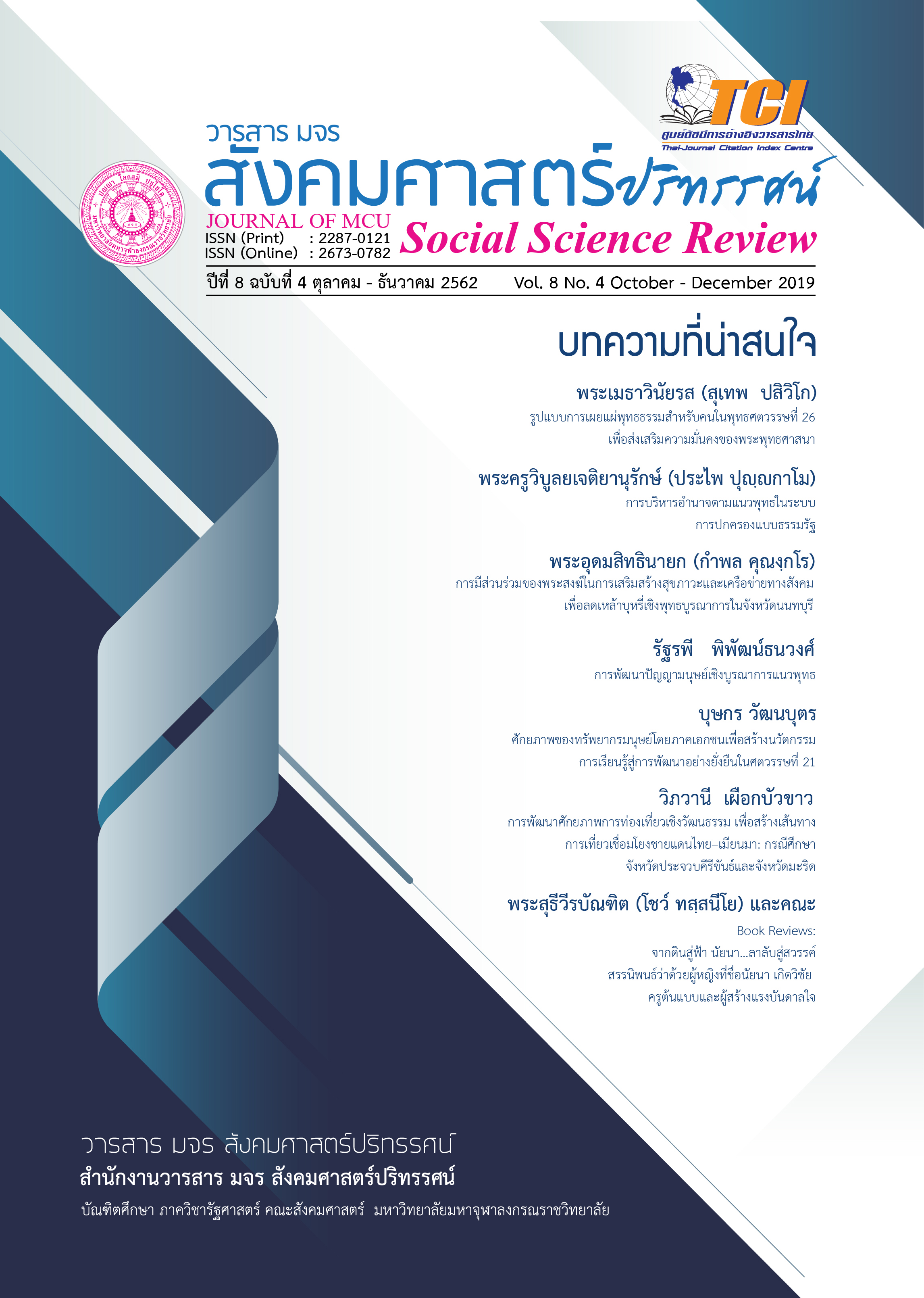การพัฒนาปัญญามนุษย์เชิงบูรณาการแนวพุทธ
คำสำคัญ:
การพัฒนาปัญญา, ทฤษฎีพหุปัญญา, จิต 5 ลักษณะ, บูรณาการด้วยพุทธธรรมบทคัดย่อ
การวิจัยเรื่องการพัฒนาปัญญามนุษย์เชิงบูรณาการแนวพุทธ มีวัตถุประสงค์ดังนี้ 1) เพื่อศึกษาแนวคิดและทฤษฎีการพัฒนาปัญญามนุษย์ 2) เพื่อศึกษาการพัฒนาปัญญามนุษย์ในพระพุทธ ศาสนาเถรวาท 3) เพื่อบูรณาการแนวคิดและทฤษฎีการพัฒนาปัญญามนุษย์ด้วยพุทธธรรม และ 4) เพื่อเสนอ “รูปแบบการพัฒนาปัญญามนุษย์เชิงบูรณาการแนวพุทธ” ในการวิจัยนี้เป็นการวิจัยเชิงคุณภาพ (Qualitative Research) โดยใช้ระเบียบวิธีวิจัยเอกสาร และทำการสัมภาษณ์เชิงลึก (In-depth interview) จากนั้นทำการสนทนากลุ่ม (Focus Group) เพื่อยืนยันผลการวิจัย
ผลการวิจัยพบว่า พหุปัญญาสามารถนำมาพัฒนาในกรอบของจิตชำนาญการและจิตเคารพ เพื่อพัฒนาความชำนาญในศาสตร์ต่าง ๆ และจริยธรรมไปพร้อมกัน โดยนำพุทธธรรม 7 ขั้นตอนมาพัฒนาพหุปัญญากลุ่มทักษะการเรียนรู้ 6 ด้านให้เกิดความชำนาญการ และนำพหุปัญญาที่เกี่ยวกับมนุษยสัมพันธ์และการดำเนินชีวิต 4 ด้านมาบูรณาการกับหลักธรรมเพื่อสร้างจิตเคารพ โดยเริ่มจากการสร้างสัมมาทิฏฐิให้มีความเห็นที่ถูกต้อง มีความเคารพในพระรัตนตรัยและศึกษาพระธรรมอย่างต่อเนื่อง สามารถพิจารณาสิ่งต่าง ๆ อย่างลึกซึ้งด้วยโยนิโสมนสิการ หมั่นเจริญสติตามหลักธรรมอนุสติ 10 และดำเนินชีวิตด้วยความไม่ประมาท เมื่อปฏิบัติดังนี้จะสามารถปฏิสันถารกับผู้อื่นได้อย่างเหมาะสม ทั้งนี้จะมีหลักธรรมอินทรีย์ 5 เป็นตัวชี้วัดและสร้างความสมดุลให้การพัฒนาปัญญาดำเนินไปอย่างต่อเนื่อง ความชำนาญในศาสตร์ต่าง ๆ พร้อมด้วยคุณธรรมจะทำให้บุคคลสามารถสังเคราะห์และสร้างสรรค์สิ่งที่เป็นประโยชน์ต่อตนเองและสังคมได้ กล่าวได้ว่าเป็นผู้ที่ได้รับการพัฒนาปัญญาตามรูปแบบองค์ความรู้ใหม่ BWD Model
เอกสารอ้างอิง
Channarong Pornrungroj. (2015). Ten Problems with the Thai Education System, Matichon Online, 26 June 2015, ttp://www.matichon.co.th/news_detail.php?newsid=1435302805.
Howard Gardner. (1983). Frame of mind. New York: Basic book.
Howard Gardner. (1999). Intelligence Reframed. New York: Basic book.
Howard Gardner. (2011). Multiple Intelligences Theory and Five Minds Theory for Success in Globalization. The 4th Annual Congress for Teacher Professional Development.
Howard Gardner. (2011). 21st Century Skills: Rethinking How Students Learn. Bangkok: Openworlds publishing house.
Mahachulalongkornrajavidyalaya University. (1996). The Tipitaka in Thai Version belonging to Mahachulalongkornrajavidyalaya University. Bangkok: Mahachulalongkornrajavidyalaya University.
Ministry of Education. (2008). The Basic Education Core Curriculum B.E. 2551 (A.D. 2008). No. OBEC 293/2551.
Phrarajavoramuni (Prayoon Dhammacitto). (2000). The learning process in Buddhism. Bangkok: Kurusapa Printing Ladphrao.
Richard MacEwan. (2008). Reading between the Lines: Knowledge for Natural Resource Management. Landscape analysis and visualization.
Symantec Corporation. (2014). Internet Security Threat Report 2014: Volume 19. (Published April 2014).
Tisana Khammanee. (2012). Pedagogy. Bangkok: Chulalongkorn University Press.
ดาวน์โหลด
เผยแพร่แล้ว
รูปแบบการอ้างอิง
ฉบับ
ประเภทบทความ
สัญญาอนุญาต
ลิขสิทธิ์ (c) 2019 วารสาร มจร สังคมศาสตร์ปริทรรศน์

อนุญาตภายใต้เงื่อนไข Creative Commons Attribution-NonCommercial-NoDerivatives 4.0 International License.
เพื่อให้เป็นไปตามกฎหมายลิขสิทธิ์ ผู้นิพนธ์ทุกท่านต้องลงลายมือชื่อในแบบฟอร์มใบมอบลิขสิทธิ์บทความให้แก่วารสารฯ พร้อมกับบทความต้นฉบับที่ได้แก้ไขครั้งสุดท้าย นอกจากนี้ ผู้นิพนธ์ทุกท่านต้องยืนยันว่าบทความต้นฉบับที่ส่งมาตีพิมพ์นั้น ได้ส่งมาตีพิมพ์เฉพาะในวารสาร มจร สังคมศาสตร์ปริทรรศน์ เพียงแห่งเดียวเท่านั้น หากมีการใช้ภาพหรือตารางหรือเนื้อหาอื่นๆ ของผู้นิพนธ์อื่นที่ปรากฏในสิ่งตีพิมพ์อื่นมาแล้ว ผู้นิพนธ์ต้องขออนุญาตเจ้าของลิขสิทธิ์ก่อน พร้อมทั้งแสดงหนังสือที่ได้รับการยินยอมต่อบรรณาธิการ ก่อนที่บทความจะได้รับการตีพิมพ์ หากไม่เป็นไปตามข้อกำหนดเบื้องต้น ทางวารสารจะถอดบทความของท่านออกโดยไม่มีข้อยกเว้นใดๆ ทั้งสิ้น





